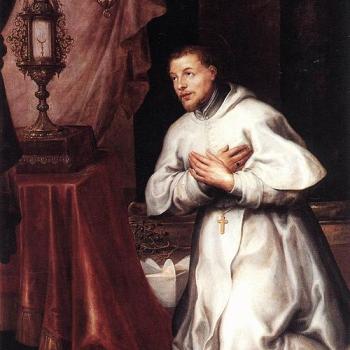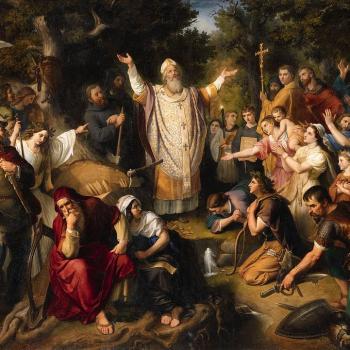We continue our series “After Pentecost.” Exploring the life of the Christian in “Ordinary Time”. Todays perspective is brought by guest blogger Yasuyuki Kamata.
Yasu Kamata is a recent graduate of North Park Theological Seminary. A native of Japan, he will return to his home country from this fall and serve with KGK, a member of the International Fellowship of Evangelical Students (IFES) and a sister organization of InterVarsity Christian Fellowship. His role would be “to help students grow deeper and broader” – deeper by understanding historical Christian faith, and broader by being exposed to the realities of this world, on campus and beyond. For a description of the IFES movement, please visit http://www.ifesworld.org/ or http://www.ifeseastasia.org/.
Striving and Trusting for the Kingdom
The disclaimer, or a statement of the obvious
As I write this reflection, I would like to give a disclaimer, or state the obvious: This is not a balanced reflection. I am a person with a particular story, and this reflection comes from a particular moment and time in my life. As I type it from my notes, I find myself feeling a desire to nuance or balance some statements. The logical connections might not be that clear either. But I will let them be, with some of the rawness and lack of balance, with the hope that others will graciously correct me.
How hard it is for the rich to enter the kingdom of God!
What does it mean to be a Christian living after Pentecost? As many of our readers would know, Pentecost is the coming of the Holy Spirit. Because the Holy Spirit dwells in us, we are able to live a “kingdom lifestyle,” to live as if the coming kingdom of God has come on earth.
The other day, I was reflecting on how privileged I am. I was born in the country with the 2nd highest GDP in the world, and currently live in the country at the top. I don’t have to worry about not having things to eat or a place to stay. I’m a man. I have a lot of choice. I just finished my 2nd Masters degree. Compared to many people in this world, I have a lot of power and privilege in this world.
As I was thinking about these things, a passage of Scripture came to mind. “How hard it is for the rich to enter the kingdom of God!” (Mark 10:23)
“How hard it is for the rich to enter the kingdom of God!” At least, Jesus does not say that it is impossible. But it’s still pretty darn hard. How hard is it? As hard as trying to make a camel go through a needle’s eye. So that’s virtually impossible. But then Jesus affirms, “with human beings this is impossible, but not with God, for all things are possible with God.”
Why is it so hard?
Why is it so hard for the rich to enter the kingdom of God?
What is the kingdom, anyway? It is, as the Taize chant goes, “justice, peace, and joy in the Holy Spirit” (Romans 14:17). It is God’s reign come to earth. It is a “new world order.” From observing Acts and reading some of Paul’s exhortations, being the Church, the herald, sign, and foretaste of the kingdom, seems to involve things like “sharing of possessions” “looking out for each other” and “accommodating to & serving each other.”
Why is it so hard for the rich to enter the kingdom of God? I think that part of the reason is that the rich has enough power to erect their own kingdom in which everything revolves around them. I will state the following as a person with power and privilege – we create our own kingdom so we won’t have to share, look out for others, or accommodate to others. Instead, we get to live at our own fast pace, our own convenience, and satisfy our own “needs.” The paradox is, however, that by living such a life, we, the rich, manage to alienate ourselves from true kingdom lifestyle, which is abundant life itself.
Now, no one will ever be free from the allure to live a self-serving lifestyle. The moment one gains comparatively greater power & wealth (broadly defined) over others, the temptation happens. Issues of power and wealth is present in every level of human existence; between husband and wife, within a family, between friends . . . someone once said that as soon as there are two people, politics occur. Likewise, as soon as there are two people, issues of power and wealth start to occur.
The human predicament is to use whatever power or wealth for our own good. It would therefore be good for us to remember that we are blessed so that we may be a blessing, and that we are saved from the tyranny of sin, death, and the devil and saved for service to God and neighbor. It would be good for us to remember the 12 apostles’ request to Paul that he will continue to remember the poor (Galatians 2:10). For our purposes, it would probably be good to expand the notion of poverty beyond material to include spiritual dimensions.
Lukewarmness and helplessness
So how can we start to live like in such a way that “remembers the poor”?
Now, the other day, I was visiting this blog (http://krazydelicious.blogspot.com/) and came across a summary from chapter 4 of Francis Chan’s book Crazy Love, called “Profile of the Lukewarm.” One of the characteristics, according to the summary, is that “Lukewarm people are thankful for their luxuries and comforts, and rarely consider trying to give as much as possible to the poor. They are quick to point out, “Jesus never said money is the root of all evil, only that the love of money is.” Untold numbers of lukewarm people feel “Called” to minister to the rich; very few feel “called” to minister to the poor.”
Well, that description hurts because it applies to my life. Being in an academic institution, I’ve found it pretty easy to get caught up with attending to just my own needs and seek out relationships that would benefit me. In a few months, I will be in the world of student ministry, but I’m sure it would be very tempting to work only with the best and brightest and neglect the least, the last, and the lost, both on campus, across the country, and around the world.
What shall I do, then? I’m from the world of student ministry, so I will quote from a book that was popular in that world as well. Ole Hallesby, in his bookPrayer, has a great passage that I will quote in length:
“Prayer and helplessness are inseparable. Only he (pardon the non-inclusive language – it’s from 1931!) who is helpless can truly pray.
“Listen to this, you who are often so helpless that you do not know what to do. At times you do not know how to pray. Your mind seems full of sin and impurity. Your mind is preoccupied with what the Bible calls the world . . . Now and then you must ask yourself the question, ‘Do I really desire to be set free from the lukewarmness of my heart and my worldly life? Is not my Christian life always lukewarm and half-hearted for the simple reason that deep down in my heart I desire it that way?’
“Thus an honest soul struggles against the dishonesty of his own being. He feels himself so helplessly lost that his prayers freeze on his very lips.
“Listen, my friend! Your helplessness is your best prayer. It calls from your heart to the heart of God with greater effect than all your uttered pleas. He hears it from the very moment that you are seized with helplessness, and He becomes actively engaged at once in hearing and answering the prayer of your helplessness. He hears today as He heard the helpless and wordless prayer of the man sick with the palsy (Hallesby, 17).”
Hallesby’s point is: we cannot live the kingdom lifestyle by our own strength; that is to assert our self-sufficiency. No, in the face of sin, we are not self-sufficient at all. But it is in the place of helplessness, in the place where we accept that we are powerless against the powers of this world, that God can start to do his good work in us by the power of the Holy Spirit.
Because He has done it
I recently came across a book called Wild Man to Wise Man. That might sound a bit too pop-psychology-like to some, but this was written by Richard Rohr (the Franciscan monk who wrote the big book on the Enneagram), so it’s a pretty wise book. Now, in this book, Rohr has this chart in which he outlines the different stages a person goes through. At the very final stages, he has a stage which he calls “the holy fool.” The description of that stage, if I remember correctly, is something like “fully enjoying and swimming in God’s grace because they know He has done it!”
“He has done it.” Not by their own effort, but because He has done it.
I know a couple of people whom I think could be classified as Rohr’s “holy fools.” They are all old people, who have seen the thick and thin of a life lived in, with, and for God. And they live a kingdom lifestyle that I can’t emulate. Not that they are perfect, but they have been greatly transformed by God through many years of struggle. No doubt, they must have had many moments of feeling helpless as well in the midst of those.
So, as people living in this post-Pentecost world, still waiting for the fullness of the kingdom to come, let us struggle. Let us strive to live the kingdom lifestyle, and “work out our salvation with fear and trembling” (note – working out one’s salvation isn’t about “earning our salvation through works” but about “starting to use and train what you already have,” like “working out your body” in a gym). At the same time, let us not be disappointed, be disillusioned, or lose hope when we – either as individuals or as the Church – find out that we fall short of the kingdom lifestyle, but continue with the assurance that “it is God who works in you to will and act in order to fulfill his good purpose.” But rather, let us remember that when we stand absolutely helpless before the enormity of our own sin and the sins of the world, that is when God works most powerfully, ”for when I am weak, he is strong.” And let us keep running the race in the confidence that when we persevere, the holy fool-ness in us will continue to grow, and that on the day the kingdom comes, we will look back and say “yes, he has done it!”












